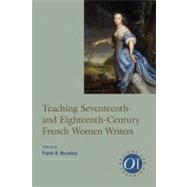Teaching Seventeenth- and Eighteenth-century French Women Writers
, by Beasley, Faith E.- ISBN: 9781603290951 | 1603290958
- Cover: Hardcover
- Copyright: 10/1/2011
Seventeenth- and eighteenth-century France has been celebrated as the period of conversation. Salons flourished and became an important social force. Women and men worked together, in dialogue with their contemporaries, other texts, and their culture to create novels, political satire, drama, poetry, fairy tales, travel narratives, and philosophy. Yet the inclusion of women's contributions, only recently recovered, changes the way we conceive of the period that constitutes one of the building blocks of French national identity and Western civilization, and teachers are often unsure how and where to incorporate the texts into their courses. Teaching Seventeenth- and Eighteenth-Century French Women Writers attempts to reconstruct these conversations by integrating women's work into classrooms across the curriculum. The works of French women writers are crucial to courses on the early modern period and enliven many others--whether on literature, history, women's history, the history of science, philosophy, women's and gender studies, or European civilization. The essays included in part 1 provide necessary background and help instructors identify places in their courses that could be enriched by taking women's participation into account. Contributors in part 2 focus on some of the central writers and genres of the period, including Lafayette, Charrière, and Graffigny, the epistolary novel, convent writing, and memoirs. The essays in part 3 offer concrete descriptions of courses that place women's texts in dialogue with those of their male colleagues or with historical issues.







